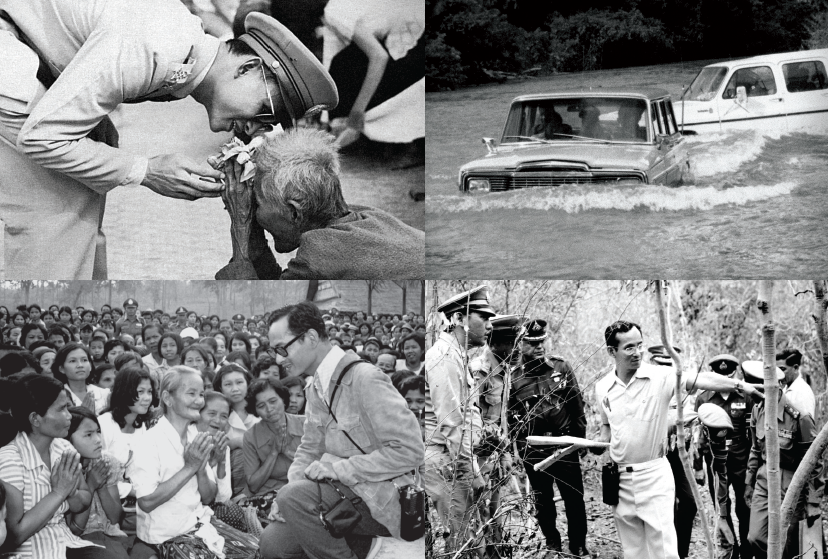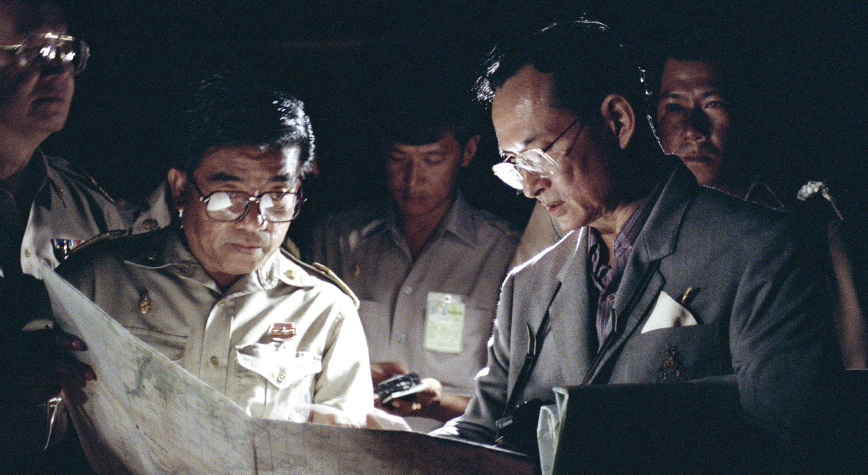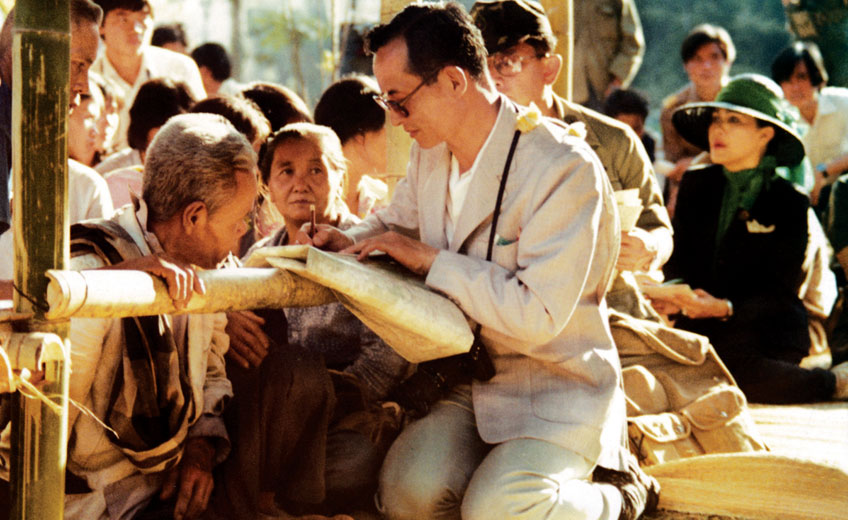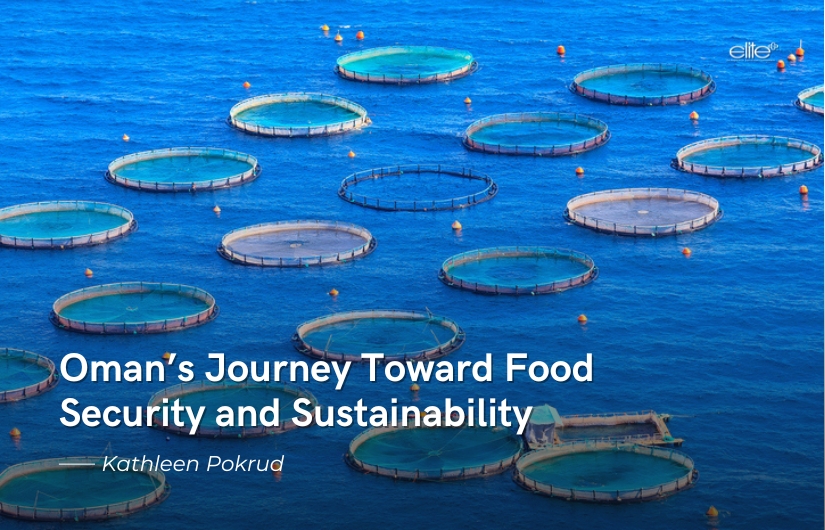His Majesty King Bhumibol Adulyadej may have passed away, but his legacy of love and care will remain, and for over 65 million Thais the beloved King remains close to our hearts. The 4,447 royal initiative projects supporting his sufficiency theory will also continue. His spirt of settakit por pieng, or sufficiency economy philosophy (SEP), is remembered globally as a pioneering guideline for sustainable development.
HM King Bhumibol Adulyadej, who passed away on October 13, came up with the idea of sustainable development decades ago, before it had become a paradigm for world leaders, the United Nations and now corporations as a tenet of social responsibility. HM the King was an avant-garde country developer, and leaders and development institutes often refer to the example set by his development programmes.
Irina Bokova, director-general of UNESCO, spoke in homage to HM King Bhumibol on October 17.
“I recall well the Future Lecture we held here at UNESCO in 2012 on the sufficiency economy philosophy – a new ethical paradigm for sustainability,” said Ms Bokova.
“Today this vision, composed of three pillars – moderation, reasonableness and risk management, and built on knowledge and virtue – continues to provide philosophical guidance for Thailand, and is an inspiration for people everywhere.
“I believe this vision resonates with UNESCO’s ideals and priorities, and with the spirit of the 2030 Agenda for Sustainable Development that the international community has agreed to. His Majesty’s lifelong commitment to development and to the marginalized, his ceaseless pursuit of knowledge and his advocacy for education, are an inspiration to all of us.”
_2000707372.png)
In his birthday speech in 1997, HM the King described as folly the ambition of the country to become an “economic tiger” through reckless speculation and easy credit. He wanted to develop “an economy where people are self-reliant and have an adequate livelihood for themselves”. His words brought some sense to Thais seduced by material wealth.
The Thai government has promoted HM the King’s sufficiency economy philosophy as a model for sustainable development, aligned with the UN’s sustainable development principles. As head of the G77 this year, Thailand through the Ministry of Foreign Affairs has been promoting SEP as a model for the southern hemisphere. In this role, Thailand represents 134 countries, including China, at UN meetings in
New York and beyond.
Virachai Plasai, ambassador for Thailand to the UN, told media that HM the King’s SEP closely aligns with UN sustainable development goals, including goal 12: ensure sustainable consumption and production patterns; and goal 14: conserve and sustainably use the oceans, seas and marine resources for sustainable development.
When delegates of G77 countries visited Thailand, Mr Virachai brought them to Khao Hin Son Royal Development Study Centre in Chachoengsao Province. The project illustrates ecological restoration, soil recovery and community, adopting sufficiency economy as a guide for life, investment and farming.
Settakit por pieng, coined by His Majesty in 1997 amid the Asian financial crisis, has similar objectives to the UN’s post-2030 sustainable development agenda, which aims to achieve “inclusive and sustainable economic growth” and create a world “in which consumption and production patterns and use of all natural resources from air to land, from rivers, lakes and aquifers to oceans and seas are sustainable”. HM the King received a lifetime achievement award from the United Nations Development Programme (UNDP) in 2006.
“Like human development, the sufficiency economy places humanity at its centre, focuses on well-being rather than wealth, makes sustainability the very core of thinking, understands the need for human security and concentrates on building people’s capabilities to develop their potential,” said Joana Merlin-Scholtes, UN resident coordinator and UNDP resident representative in Thailand in 2007.
“And it adds a spiritual dimension to human development, reflecting the King’s own character convictions and sincerity.”
The history and evolution of Thailand are unique. It was one of the few countries in the region to survive imperialism and colonization by Britain or France. During the Cold War, the Kingdom was a staunch ally of the US in its fight against communism in Indochina. As war ended in the region, Thailand emerged as an economic dynamo. Two decades later, Thailand was the first casualty of the Asian financial crisis in 1997, when unsustainable investment led to bad debts in the real estate sector and economic woes were compounded by currency speculation.
The institution of the monarchy has been there through the ups and downs of development. Before 1932, when the political system changed from absolute to constitutional monarchy, the monarchy ran the country. When HM King Bhumibhol became king, however, the country was under dictatorship and the monarchy was almost powerless.

Yet he spent decades visiting rural areas and creating ways for people in the countryside the majority of Thais at the time to farm and have enough to be content and happy.
Thailand became a new economic powerhouse as it modernized and urbanized. And when the economic system ground to a halt in late 1997, desperate Thais turned to him for guidance.
In his birthday speech in 1997, HM the King described as folly the ambition of the country to become an “economic tiger” through reckless speculation and easy credit. He wanted to develop “an economy where people are self-reliant and have an adequate livelihood for themselves”. His words brought some sense to Thais seduced by material wealth.
HM the King emphasized the importance of moderation in his philosophy that has universal relevance and application.
“Sufficiency is moderation,” the monarch said during his birthday speech in 1998. “If one is moderate in one’s desires, one will have less craving. If one has less craving, one will take less advantage of others. If all hold this concept without being extreme or insatiable in their desires, the world will be a happier place.”
The monarch always led by example. After his inauguration in 1946, the US-born, Swiss-educated King Bhumibol found a way to evade the tight control of the dictatorship by visiting poor communities in rural areas. Over the decades, the monarch created projects to release his subjects from poverty. Most of the projects combined technology and local wisdom to complement the natural resources that help people farm and make a living. The young King found a way and a vision to help his subjects become self-reliant and rise out of poverty, have access to welfare, education, health care and a better environment. Over the decades of visiting his people, HM King Bhumibol created thousands of initiatives to help his subjects lead a sufficient and comfortable life.
In 1952, the first rural development project at Huai Mongkol Village in Hua Hin was established to eradicate the poverty of farmers by improving ecology.
In 1969, the Royal Project was created and has been thriving ever since.
In the same year was the first successful experiment with artificial rain-making. Rain fell in the targeted area in Pak Chong District in Nakhon Ratchasima. HM the King had studied engineering at the University of Lausanne and was always passionate about science and the environment, and hoped artificial rain-making methods could help alleviate droughts. His “super sandwich” technique of using aircraft to create warm and cold clouds at different altitudes to make rain was granted a patent by the European Union in 2006, and has been applied in such places as Queensland in Australia, Jordan and Tanzania.
In 1988, the non-governmental Chaipattana Foundation was established with His Majesty as president. In the same year, the Royal Project won the Magsaysay Award known as the Asian Nobel Peace Prize.
In 1989, the first model of an oxygenenhancing aerator was installed for recycling and purifying waste water at Phramongkutklao Hospital and Wat Bawon Niwet. The “Chaipattana Aerator” was patented in 1993.
In 1994, His Majesty unveiled his “new theory”, a new approach to agricultural development, during his birthday speech. The new theory for farming promoted sufficiency and moderate-scale farming, with an emphasis on ecologically balanced and sustainable use of land, water and forest.
In 1997, His Majesty’s sufficient economy concept gained public recognition and helped save the country from economic crisis and permeated into the psyche of Thais as well as public and private institutes.
In 2006, UN Secretary General Kofi Annan presented the first UNDP Human development Lifetime Achievement Award to HM the King.
In 2009, the World Intellectual Property Office (WIPO), a UN body tasked with protecting intellectual property rights, bestowed the WIPO Global Leadership Award to HM the King as a champion of intellectual property rights and a prolific inventor, with some 20 patents and 19 registered trademarks to his name.
In 2013, the Food and Agriculture Organisation (FAO) of the UN declared December 5, His Majesty’s birthday, as World Soil Day. HM the King’s conservation projects have long been lauded among soil scientists. The International Union of Soil Sciences (IUSS) had begun celebrating World Soil Day in 2002, and in 2012 designated HM the King as its first humanitarian soil scientist.
The experience of practising sufficient economy plus 4,447 royal projects have given Thailand know-how to share with other countries. Thailand has shared SEP practices with the likes of Bhutan, Lesotho, Laos, Timor-Leste, Tonga, Cambodia and Myanmar through the state’s development organization, the Thailand International Cooperation Agency (TICA).
TICA was established in 2004 by royal decree to serve as a focal agency under the Ministry of Foreign Affairs in administrating international development. TICA is principally responsible for the implementation of Thailand’s development cooperation programmes in neighbouring countries and other parts of the world. Cooperation takes on various forms such as development projects, volunteer and expert programmes, fellowships, scholarships and training.

TICA promotes south-south and north-south cooperation under partnership programmes with donor countries, non-governmental organizations and international agencies. Foreign scholars studying sustainable management have also looked to His Majesty’s sufficiency thinking as a model.
Gayle C Avery, professor at Macquarie University, Australia; and Harald Bergsteiner, honorary professor at Australian Catholic University, co-edited Sufficiency Thinking: Thailand’s Gift to an Unsustainable World. Contributors to the book include Thanpuying Suthawan Sathirathai, chairperson of the Good Governance for Social Development and Environment Institute Foundation; Nattapong Thongpakdee, professor of economics and director of sufficiency economy studies at the National Institute of Development Administration; and Veerathai Santiprabhop, governor of the Bank of Thailand. Published this year, it is credited as “a very different book about Thailand”. As Mr Hallinger wrote about HM the King in the introduction:
“Consistent with Buddhist precepts, King Bhumibol has suggested that the solution to the Malthusian trap may lie within us rather than outside. Like Gandhi, he asserts that changing our attitudes will lead to changes in our behaviour. Thus sufficiency thinking challenges us to rethink key assumptions that drive us as individuals, organizations and societies.”
































































































































































































































































































































































































































































































































































































































































































































































































































































































































